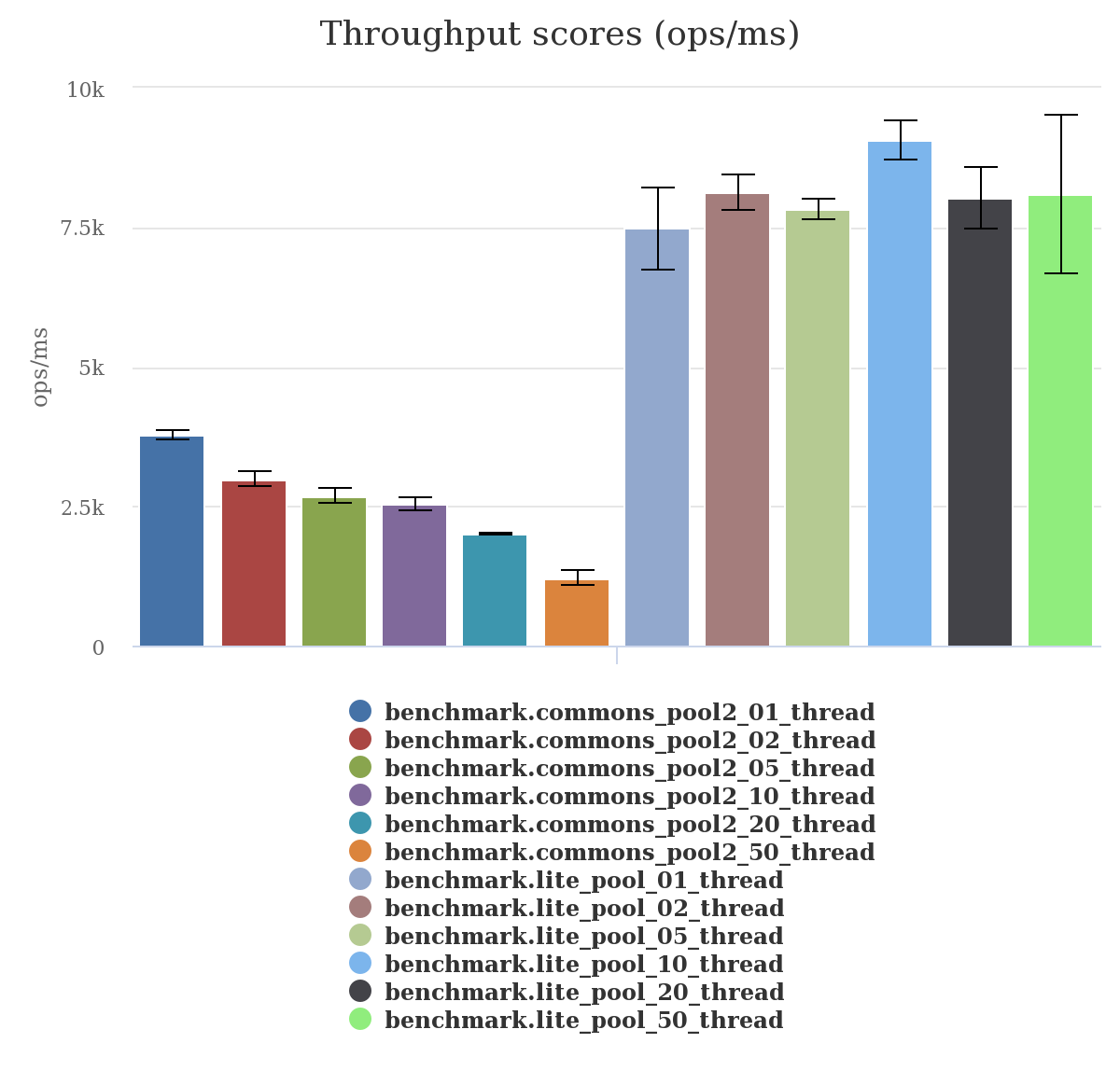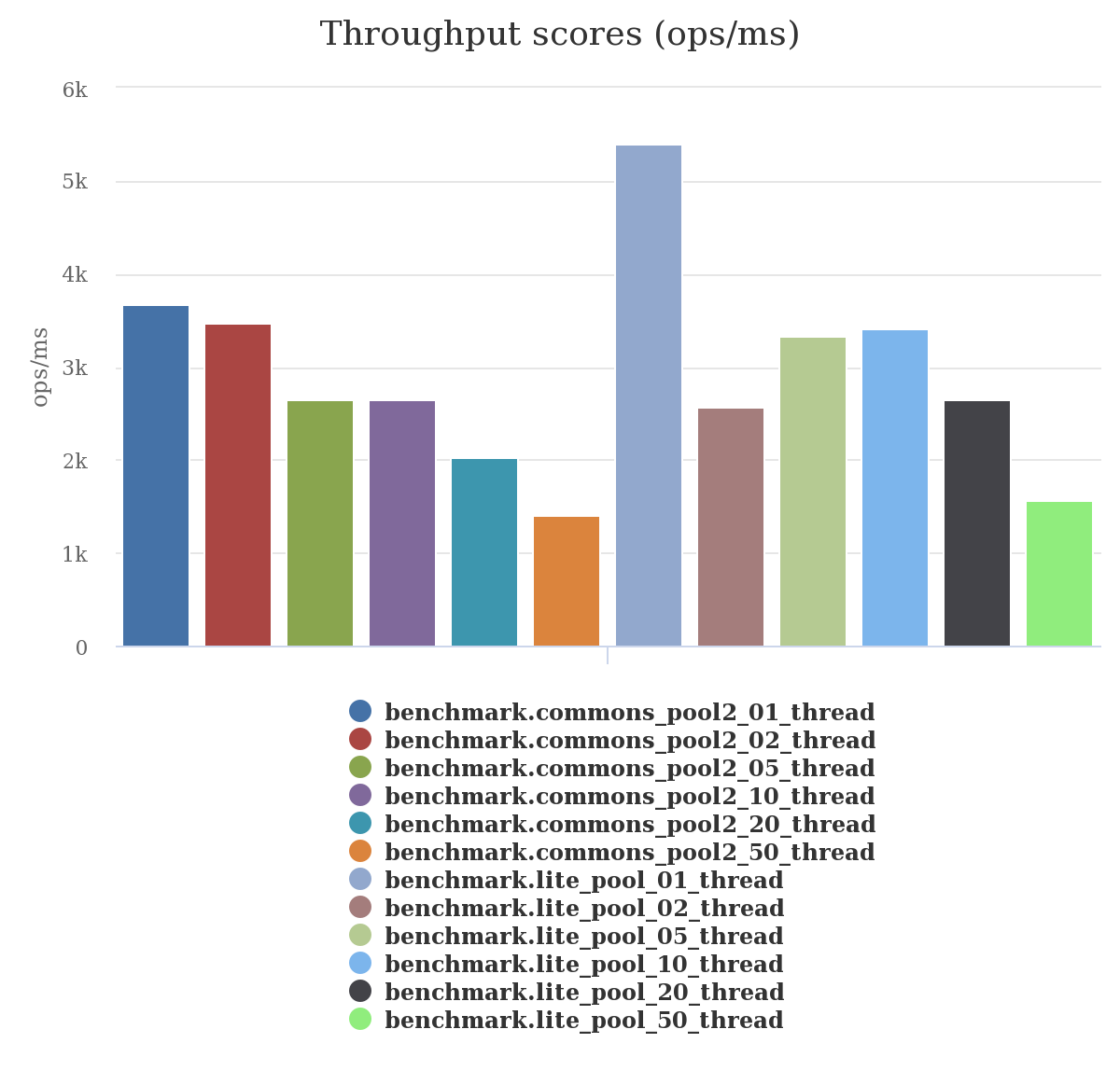nextopcn / Lite Pool
Licence: apache-2.0
A lite fast object pool
Stars: ✭ 42
Programming Languages
java
68154 projects - #9 most used programming language
Projects that are alternatives of or similar to Lite Pool
fastthreadpool
An efficient and lightweight thread pool
Stars: ✭ 27 (-35.71%)
Mutual labels: fast, pool
Server Manager
This repository holds the IntISP Interface. It can be rebuilt to interface with any other hosting panel.
Stars: ✭ 31 (-26.19%)
Mutual labels: fast
Fastify Esso
The easiest authentication plugin for Fastify, with built-in support for Single sign-on
Stars: ✭ 20 (-52.38%)
Mutual labels: fast
Blazor.fast
A tiny wrapper around Fast and Fluent Web Components to integrate with Blazor and easily use the EditForm components
Stars: ✭ 23 (-45.24%)
Mutual labels: fast
Candyview
Implement any RecyclerView in just 1 Line. CandyView handles everything for you.
Stars: ✭ 15 (-64.29%)
Mutual labels: fast
Telepyrobot
A userbot for Telegram account made using Pyrogram Library and Python
Stars: ✭ 27 (-35.71%)
Mutual labels: fast
Eager Image Loader
The eager-loading for image files on the web page that loads the files according to your plan. This differs from the lazy-loading, for example, this can be used to avoid that the user waits for the loading.
Stars: ✭ 22 (-47.62%)
Mutual labels: fast
Errand Boy
A memory-conscious alternative to os.fork() and subprocess.Popen().
Stars: ✭ 34 (-19.05%)
Mutual labels: pool
Polysnap
A work in progress polygon operations library with integer snap-rounding
Stars: ✭ 14 (-66.67%)
Mutual labels: fast
Table of Contents(中文说明)
1. Lite-pool
1.1. Brief introduction
A lite fast object pool written by Java.
1.2. Requirements
jdk 1.8+
maven-3.3.1+(support toolchains)
1.3. Maven dependency
<dependency>
<groupId>cn.nextop</groupId>
<artifactId>lite-pool</artifactId>
<version>1.0.0-RC3</version>
</dependency>
1.4. Install from source code
$mvn clean install -Dmaven.test.skip=true --global-toolchains ./toolchains.xml
2. Usage
2.1. PoolBuilder
| Config | Default value | Details |
|---|---|---|
| minimum | 0 | minimum allowed objects in pool |
| maximum | 16 | maximum allowed objects in pool |
| tti | 15 minutes | time to idle, optional maximum pool objects' idle time, unit ms |
| ttl | 60 minutes | time to live, optional maximum pool objects' life time, unit ms |
| tenancy | 1 minutes | optional leak detection timeout, unit ms, (MUST >= interval) |
| timeout | 8 seconds | default acquire timeout, unit ms |
| interval | 15 seconds | default house keeping scheduler's interval, unit ms |
| local | true | use ThreadAllocator as L1 cache or not |
| verbose | false | print log or not |
| fifo | false | pool allocation policy, false has better performance |
| allocator | DefaultAllocator | pool allocator, can be customized by extending AbstractAllocator
|
| supplier | required callback for creating pool objects | |
| consumer | optional callback for destroying pool objects | |
| validator | optional callback for validating pool objects | |
| validation | PULSE | precondition for validator, e.g : new PoolValidation((byte)(PULSE|ACQUIRE|RELEASE))
|
2.2. Standalone usage
public class YourPoolObject {
}
Pool<YourPoolObject> pool = new PoolBuilder<YourPoolObject>()
.local(true) // using thread local
.supplier(() -> new YourPoolObject())
.interval(interval)
.minimum(minimum)
.maximum(maximum)
.timeout(timeout)
.ttl(ttl)
.tti(tti)
.verbose(true)
...
.build("object pool");
pool.start();
try {
for(int i = 0; i < 1000; i++) {
YourPoolObject object = null;
try {
object = pool.acquire();
if (object != null) {
// your code goes here.
}
} finally {
if (object != null) pool.release(object);
}
}
} finally {
pool.stop();
}
2.3. Spring integration
public class YourPoolObject {
}
package your.package;
public class Factory implements Supplier<YourPoolObject> {
@Override
public YourPoolObject get() {
return new YourPoolObject();
}
}
Spring configuration:
<bean id="your.object.pool" class="cn.nextop.lite.pool.impl.ObjectPool"
init-method="start" destroy-method="stop">
<constructor-arg index="0" value="your.object.pool"/>
<property name="config">
<bean class="cn.nextop.lite.pool.PoolConfig">
<property name="minimum" value="10"/>
...
<property name="supplier">
<bean class="your.package.Factory"/>
</property>
</bean>
</property>
</bean>
3. PoolListener
Pool<YourPoolObject> pool = new PoolBuilder<YourPoolObject>()
.local(true) // using thread local
.supplier(() -> new YourPoolObject())
...
.build("object pool");
pool.addListener(event -> {
YourPoolObject item = event.getItem();
switch (event.getType()) {
case ACQUIRE:
// your code goes here
break;
case RELEASE:
// your code goes here
break;
case LEAKAGE:
// your code goes here
break;
default:
throw new AssertionError();
}
});
pool.start();
4. Write your own PoolAllocator
public class YourPoolAllocator<T> extends AbstractAllocator<T> {
public YourPoolAllocator(Pool<T> pool, String name) {
super(pool, name);
}
@Override
protected Slot<T> doRelease(T t) {
// if uses thread local as L1 cache, thread allocator will try to acquire without delegating to
// parent allocator, but always delegate to parent to release. that requires your allocator is
// able to remove duplication on release.
//
// if pool object is invalidated, your allocator should delete it and invoke super.consume(t).
//
// please refer to DefaultAllocator and AllocationQueue for more details.
return null;
}
@Override
protected Slot<T> doAcquire(long timeout, TimeUnit unit) {
// returns null if timeout or thread is interrupted.
// if the acquired object is invalid and do not reach out timeout, do following steps:
// step1 : permanently delete it and invoke super.consume(t).
// step2 : acquire again until timeout.
//
// please refer to DefaultAllocator and AllocationQueue for more details.
return null;
}
public static class Factory<T> implements PoolAllocatorFactory<T> {
@Override public final PoolAllocator<T> create(final Pool<T> v) {
String n = v.getName() + ".allocator.your.name"; return new YourPoolAllocator<>(v, n);
}
}
}
Register YourPoolAllocator to Pool
Pool<YourPoolObject> pool = new PoolBuilder<YourPoolObject>()
.allocator(new YourPoolAllocator.Factory<>())
...
.build("object pool");
5. JMX
MXBean : cn.nextop.lite.pool:type=PoolConfig
| Attribute | Modifiable | Details |
|---|---|---|
| Maximum | Yes | see 2.1. PoolBuilder |
| Minimum | Yes | see 2.1. PoolBuilder |
| Tenancy | Yes | see 2.1. PoolBuilder |
| Timeout | Yes | see 2.1. PoolBuilder |
| Tti | Yes | see 2.1. PoolBuilder |
| Ttl | Yes | see 2.1. PoolBuilder |
| Verbose | Yes | see 2.1. PoolBuilder |
MXBean : cn.nextop.lite.pool:type=PoolAllocator
| Attribute | Modifiable | Details |
|---|---|---|
| EntireCount | No | pool's entire object count. |
| WorkingCount | No | pool's working object count, equivalent to EntireCount - RestingCount. |
| RestingCount | No | pool's resting object count. |
| PendingCount | No | pool's pending request count. |
6. Benchmark
Test env:
OS : Windows 7 Home(64bit)
CPU: Intel(R) Core(TM) i3-4710 CPU @ 3.70GHz 3.70GHz
RAM: 8.00 GB
JDK: java version "1.8.0_151"
Test case:
Basic Parameters: 10 minimum, 10 maximum
TestObject object = pool.acquire();
if (object != null) pool.release(object);
(unit: ops/ms)
Parameters: see BaseTest.java
Benchmark Classes: see LitePoolBenchmark.java and CommonsPool2Benchmark.java
Run Benchmark.java
Use ThreadAllocator as L1 cache result:

Unused ThreadAllocator as L1 cache result:

Note that the project description data, including the texts, logos, images, and/or trademarks,
for each open source project belongs to its rightful owner.
If you wish to add or remove any projects, please contact us at [email protected].

